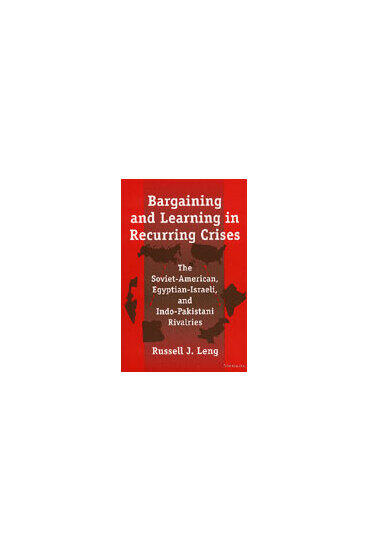Bargaining and Learning in Recurring Crises
The Soviet-American, Egyptian-Israeli, and Indo-Pakistani Rivalries
Study of the most prominent interstate rivalries in the second half of the century, and of the lessons that the leaders of the rival states drew from their recurring crises
Description
The rivalries between the Soviet Union and the United States, Egypt and Israel, and India and Pakistan produced twelve major crises and seven wars during the quarter-century following World War II. A disproportionate share of international crises and wars occur between long-term rivals. Why could not the leaders of these states learn to manage their disputes without severe crises or war? Russell J. Leng finds that the lessons leaders of those states drew from their experiences most often led to bargaining tactics that only increased the level of hostility and the likelihood of war in subsequent disputes.
The author uses theoretical work on learning and the role of belief systems on foreign policy-making as the basis to explore the history of each rivalry. Detailed narrative accounts of each of the crises are augmented by tables and figures describing the escalation of each crisis and the behavior of participant states. The approach allows for comparisons of behavior and learning across the three rivalries, as well as a consideration of the influence that the Soviet-American rivalry exerted on the Middle East and South Asian rivalries. The concluding chapter illustrates how the influence of realpolitik beliefs on learning across the three rivalries predisposed policymakers to draw lessons from their crisis experience that weakened conflict management in subsequent crises. The author also shows how superpower mediation in Middle East and South Asian crises and wars had the perverse effect of encouraging greater risk-taking by the participant states in subsequent crises.
The book will be of particular interest to political scientists and historians who study international relations, as well as those interested in decision-making and learning by policymakers.
Russell J. Leng is Professor of Political Science, Middlebury College, and the author of Interstate Crisis Behavior 1816-1980: Realism versus Reciprocity and numerous articles.
Russell J. Leng is Professor of Political Science, Middlebury College, and the author of Interstate Crisis Behavior 1816-1980: Realism versus Reciprocity and numerous articles.

